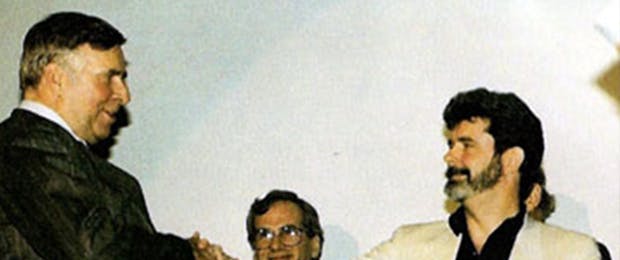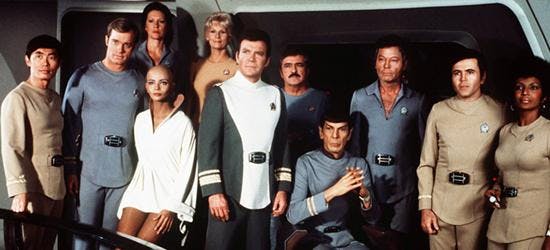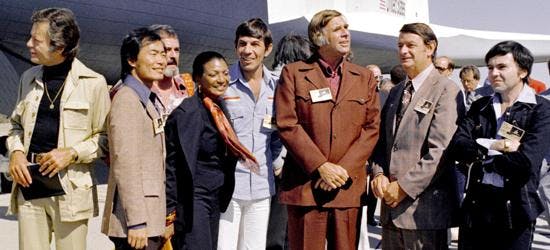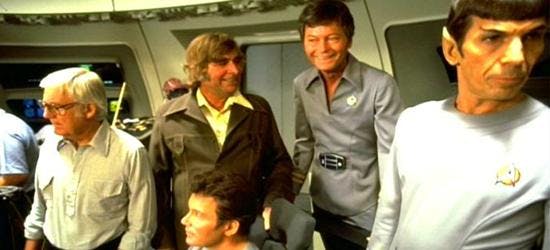Published Oct 4, 2014
Did Star Wars' Success Spur Paramount To 'Go' on ST:TMP?
Did Star Wars' Success Spur Paramount To 'Go' on ST:TMP?

Maria Jose and John Tenuto, in previous guest blogs about the history of Star Trek, took a look at how newspapers covered the television versions of Star Trek during the 1960s and 1970s. Today, they look at how newspapers covered Star Trek's move to the big screen.

There is a simplified version of Star Trek’s return that many fans have probably heard: after The Animated Series, the story goes, Star Trek was going to return to television. That is, of course, until the May 1977 premiere of Star Wars. With the new film’s amazing success, other studios scrambled to find science fiction properties to bring to theaters. The story includes the idea that executives at Paramount decided to bring Trek back because of Star Wars, and that is how Star Trek: The Motion Picture was created. Newspaper articles of the era, however, do not support this contention or version of events. (For a detailed and excellent accounting of the history, we very much recommend Judith and Garfield Reeves-Stevens’ book, Star Trek Phase II: The Lost Series).
Newspaper articles show that Star Trek’s return involves a complex history which began separately from Star Wars, and that the Wars/Trek connection is not as simple as the “straw man” story above indicates. The first murmurings of Star Trek’s return in newspapers occurred as early as 1972, just as large conventions are beginning and as Star Trek is earning great ratings in syndication. An example of this chatter is an August 4th ,1972, article by Don Freeman entitled “'Star Trek’ may fill another TV spot,” which details possible permutations for Star Trek’s return as either a television show or major motion picture. Whatever form the revival would take, Gene Roddenberry promised that "Something’s bound to gel." Roddenberry was personally getting 100 letters a week, the article reveals, asking for more adventures. Other articles detail that by July 1972, Paramount was receiving about 500 letters a week.

By 1975, two years before Star Wars was on the popular culture radar, Star Trek was announced as a motion picture. A Bridgeport Post article from March 28, 1976, discusses that although Gene Roddenberry’s script (which we now know as The God Thing) was not accepted by the studio, a film was being planned and budgeted at $5 million dollars. Because of the work of the Reeves-Stevens and others, we know this is the film would have been Star Trek: Planet of the Titans... written by Chris Bryant and Allan Scott, and directed by Philip Kaufman.
A May 2, 1977, article by Los Angeles Times reporter Ronald Soble is very important. It shows that 23 days before the premiere of Star Wars, the Star Trek film is placed on hold. The article, titled “Trekkies Will Have to Wait A While for Movie” reveals that the script needs reworking. By June, the film is cancelled (after Star Wars had become a blockbuster). A June 23, 1977, AP article appearing in local papers like the Hagerstown, Maryland The Morning Herald, actually argues for the idea that Star Wars played a role in cancelling, not creating, a Star Trek film. Gene Roddenberry is quoted in the article as saying, “I think they felt Star Wars was too similar and had taken the bloom off the subsequent Star Trek movie…” The article also details that plans had shifted for Star Trek to return to television as the flagship of a new fourth Paramount network (shades of Voyager). Other articles report that the first episode of the revitalized show was scheduled for November 1977. However, by December, 1977, newspapers are reporting that there were not enough advertisers who believed in the idea of a fourth network.
On March 18, 1978, almost 10 months after Star Wars debuted, Paramount hosted the largest press conference in its history to announce Star Trek: The Motion Picture. The success of Star Wars may have emboldened Paramount to increase the scope and budget of The Motion Picture, yet Star Trek’s return as a film was not an idea created because of Star Wars. The two franchises have many cooperative connections and parallels (from Lucasfilm’s ILM creating some of Star Trek’s most-impressive visual effects to J.J. Abrams helming revivals of both film series). Visionary creator of Star Wars George Lucas, in the documentary Trek Nation, revealed that he had attended some of the Star Trek conventions during the early 1970s, and that he admired how Gene Roddenberry had created and produced his show with very little resources (something that Lucas would do on a motion picture scale himself). While Wars and Trek are intertwined, it is important to remember, as detailed in the newspaper articles, that Star Trek’s return was rooted much more in the continued influence and popularity it engendered during the entirety of the 1970s, and in its unique history of "fanership" (click HERE for a related Tentuos blog on the subject of fanership).

In summation, newspapers are an excellent source for gaining a sense of the zeitgeist of the 1960s and 1970s eras. Newspaper journalists created something akin to the Captain’s Log, which allows researchers and fans of today a chance to learn and remember what occurred during this special era of Star Trek history.
_________
Maria Jose and John Tenuto are both sociology professors at the College of Lake County in Grayslake, Illinois, specializing in popular culture and subculture studies. The Tenutos have conducted extensive research on the history of Star Trek, and have presented at venues such as Creation Conventions and the St. Louis Science Center. They have written for the official Star Trek Magazine and their extensive collection of Star Trek items has been featured in SFX Magazine. Their theory about the “20-Year Nostalgia Cycle” and research on Star Trek fans has been featured on WGN News, BBC Radio, and in the documentary The Force Among Us. They recently researched all known paperwork from the making of the classic episode "Space Seed" and are excited to be sharing some previously unreported information about Khan's first adventure with fellow fans. Contact the Tenutos at jtenuto@clcillinois.edu or mjtenuto@clcillinois.edu.

